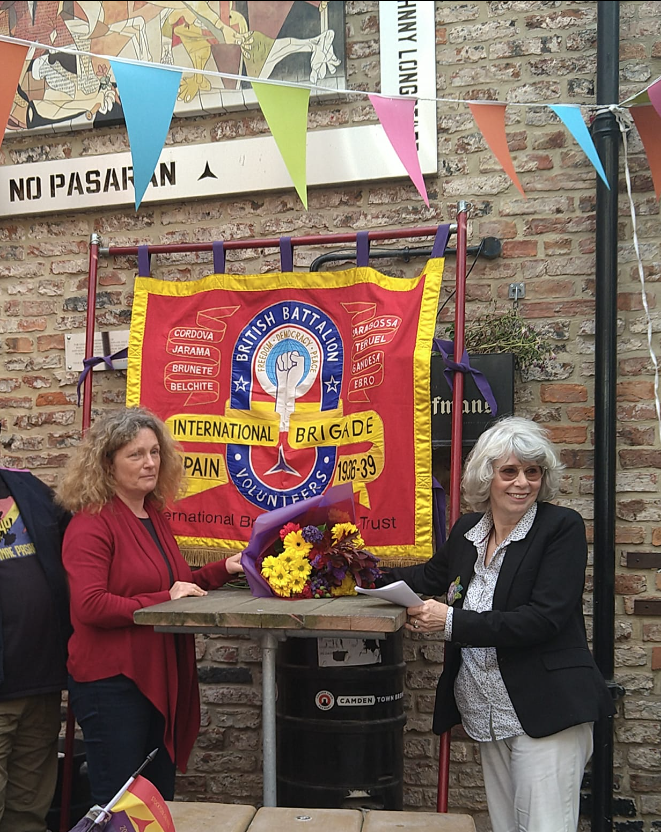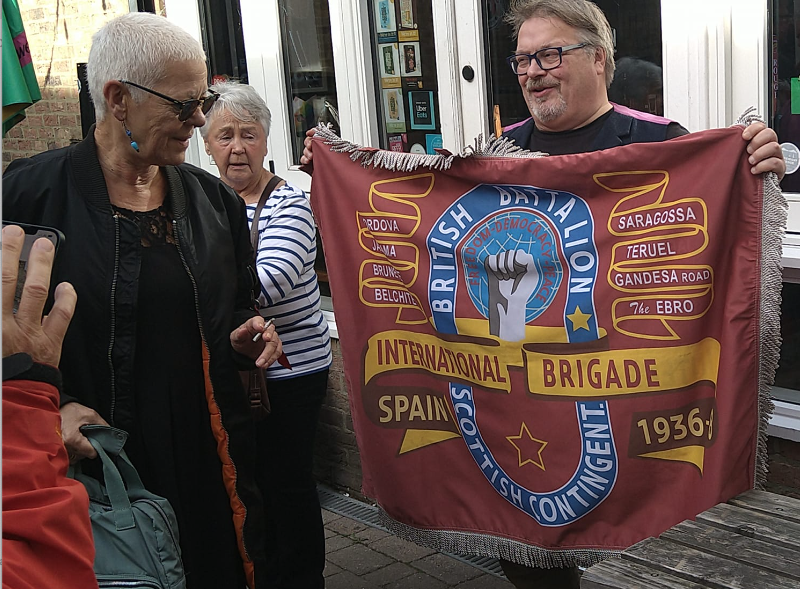International Brigade Memorial Trust
Here's the speech given by IBMT Chair Jim Jump at the commemoration on 7 October 2023 at the memorial to the International Brigaders from Stockton-on-Tees…
It’s a great honour to be able say a few words here on behalf of the IBMT during this our Annual General Meeting weekend in Stockton-on-Tees.
This is a town with with a proud history of anti-fascist struggle – like the 3,000 men and women who chased Mosley’s Blackshirts out of town in the Battle of Stockton almost exactly 90 years ago on 10 September 1933.
Several of the Teessiders at Market Cross on that day would later travel to Spain to fight Franco’s fascists.
They knew that fascism was a uniquely dangerous creed, with its toxic mix of ethno-nationalism, racism and militarism – evils that are still with us today.
In some ways they were ordinary people. Looking at the Teesside volunteers, they were scaffolders, merchant seamen, labourers, carpenters, clerks, foundry workers and dockers.
In other ways they were far from ordinary. They were, in the words of Ken Loach, ‘the cream of their generation’ and they didn’t simply appear out of the blue.

Natalie Thorp (left), great niece of William Carson, and Liz Estensen, daughter of Otto Estensen, under the memorial to the International Brigades in Stockton's Wasp Nest Yard that names them and six other men from the town who went to Spain.
Pictured above, Jim Jump raises the IBMT banner under the Stockton memorial.
These Teessiders were men whose political education had been forged in those battles against home-grown fascism, against the grinding state-enforced poverty of the 1930s, in the unemployed workers’ movement, in the hunger marches, in their communist and labour party branches, in the YCL and the Labour League of Youth.
What also makes them extraordinary is that they were willing, and in some cases did, lay their lives on the line. Nine of the 24 Teesside men made the supreme sacrifice…
…Four of them from Stockton: George Bright, Ron Dennison, Myles Harding and Bert Overton.
The others were Thomas Carter, Martin Durkin, Bob Elliott, David Halloran and John Unthank.
To mangle the words of Christy Moore’s ‘Viva La Quince Brigada’, ‘Let us all remember them today.’
Or to steal a slogan adopted by trade union campaigners for safety in the construction industry, one that chimes with the values of the International Brigades, ‘Remember the dead. Fight for the living.'
The men and women who went to Spain warned – and they were proved right – that there would be a world war unless fascism – in the form of Franco, Hitler and Mussolini trampling over Spain’s elected Popular Front government – unless fascism was stopped on the battlefields of Madrid, Jarama, Brunete, Aragón and the Ebro.
The British government had other ideas. It preferred to play footsie with the dictators in the hope that they would turn their guns on the Soviet Union.
Dressed up as neutrality, Britain’s policy of so-called non-intervention doomed the Spanish Republic by denying its government the right to buy arms to defend itself.
Let us never forget that these Men of Munich, Neville Chamberlain and the other appeasers, preferred to see a Franco victory than the survival of a progressive government in Spain.
Lots of lessons there for today, not least that most in our establishment will aways serve their class interests rather than the national interest. And they will tell lies in doing so.

At the Stockton commemoration: IBMT Scotland Secretary Mike Arnott holds the Scottish Contingent banner. Also pictured (from left) are IBMT Secretary Megan Dobney and IBMT Trustee Dolores Long.
These Teesside volunteers knew better – as did all the 2,500 from Britain and Ireland who went to Spain between 1936 and 1939, whether as soldiers, sailors, pilots, medics, nurses, doctors or administrators.
Five hundred and thirty of them gave their lives, and we remain humbled by their sacrifice and thank them for their inspirational example of international solidarity and anti-fascism.
We honour also all those lucky enough to survive the war in Spain. Many continued the fight against fascism in the Second World War – and indeed for the better world that they were defending in Spain.
And I want to leave you with the words of two of those who fought on until 1945.
The first is Johnny Longstaff. In the Second World War he joined the London Rifle Brigade. He later recalled his feelings before battle in North Africa:
I knew that some of my friends would die… I knew that others would be wounded and possibly lose a limb… I had not lost the scent of battle, the smell of blood, the stench of the bloated dead, the cries of the wounded… Once again I would be seeing fear in men’s faces … and I recalled how bravely the Republican Army and International Brigades had fought even though ill clad, ill armed and hungry and with little else but high morale and a will to win… Now, in a few days’ time, I would be fighting the same enemy.
Finally, we have the words of David Marshall, who took part in the Normandy landings and the liberation of Belsen.
As a dole office clerk in Middlesbrough, he had witnessed at first hand the humiliating poverty and obscene inequalities of the 1930s – and knew that another world was possible.
This is what he wrote in one of his poems:
They came from every corner of the earth
So many men from distant lands
Who took to arms in the defence
Of Spain’s Republic.
Madrid the magnet that drew us all
Along slow roads to Spain – at last a star
For desperate men, sensing the gathering storm
And we that fought to warn a watching world
Were called false prophets by appeasers
Remember the dead and fight for the living. ¡No pasarán!
